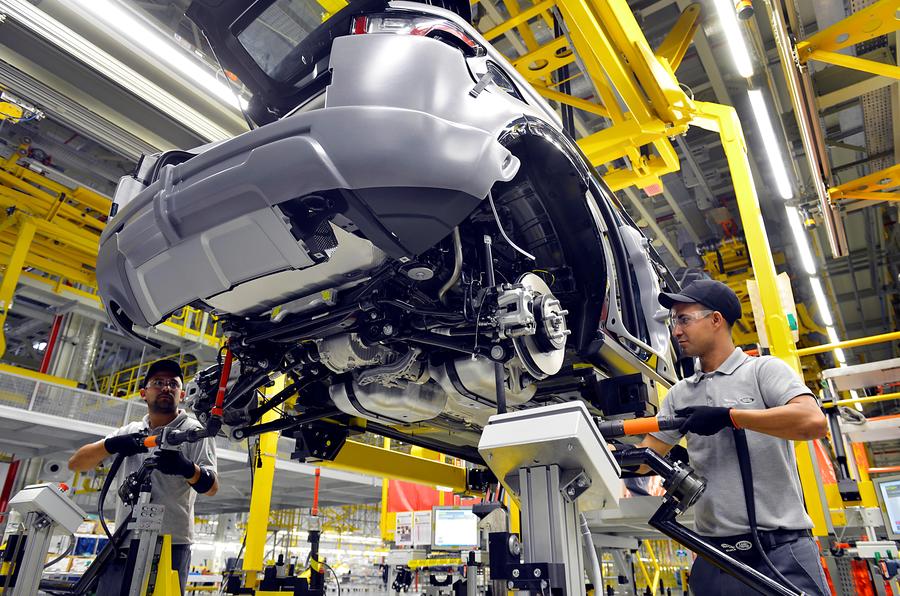The Society of Motor Manufacturers and Traders (SMMT) has called for the UK’s automotive industry to be placed at the heart of future trade deals, after publishing a report highlighting its importance to the export market.
Vehicle exports brought in £27 billion in 2020, despite the effects of the pandemic, the most of any exported commodity by value.
The automotive industry as a whole returned £74bn of combined trade last year, shy of the £100bn that would’ve been expected without the disruption caused by Covid-19.
The SMMT’s report - titled Driving Global Britain - also highlights the importance of trade with the European Union. Around half of all cars and nearly all vans made in the UK are exported to the EU’s 27 member states, while 78.1% of cars on UK roads come from the EU.
“As the world re-emerges from the pandemic, the diversity and importance of Britain’s automotive industry is the UK’s competitive advantage for restarting growth, creating jobs and tackling climate change,” said SMMT chief executive Mike Hawes.
“With automotive at the heart of future trade policy and negotiations focused on removing both the tariff and non-tariff barriers that stifle growth, we can drive forward the growth of global Britain and sustain our place as an economic, industrial and environmental leader.”
Asian and Eastern European markets are expected to grow rapidly over the next few years, and the SMMT wants dedicated automotive annexes written into future trade agreements to reduce tariffs and remove regulatory barriers.
However, Hawes admitted that deals with the US and China - the UK’s second- and third-largest export markets respectively - remain “unlikely” without fresh political will.
The report marks the SMMT’s first Global Trade Conference and comes at a time when the automotive industry is facing pressure on several fronts. The pandemic, the global semiconductor chip shortage, additional costs to supply chains as a result of Brexit and the UK government's commitment to ban new petrol and diesel vehicle sales from 2030 have all contributed in some form over the last 18 months.
Several companies are actively showing an interest in the UK as both a manufacturing base and as a market, Hawes claimed, but rising energy costs (now among the highest in Europe) and business rates could potentially prohibit investment.
Manufacturers also agree that the UK needs to deliver around 60-90GWh of domestic EV battery production by the end of the decade in order to remain competitive.
The UK lost out to Germany as a base for Tesla’s first European factory, but Britishvolt is one of a group of firms still pursuing a so-called gigafactory on British soil.






Join the debate
Add your comment
Food shortages ( jeez! ) and queues at petrol stations because of Brexit. There was no shortage of petrol, pasta or toilet rolls for that matter, it was all caused panic buying by Joe Public. No doubt they were all remoaners as they're more concerned with gossip rather than facts.
You have to take your hat off to the SMMT for inconsistancy. For the past years they've been telling us the motor manufacturing sector is in crisis and I'm now reading it's been our highest exporting commodity.
The text refers to Mike Hawes talking about his industry tackling climate change. Surely can't be the same Mike Hawes who was challenging the demonisation of diesel not so long ago.
He goes on to say he want's annexes written in to future trade agreements to reduce tariffs and regulatory barriers. So just like the agreement the EU made with the Japanese which reduced tariffs for importing cars from Japan? The result of that annex was the closure of Honda's plant at Swindon. Of course what isn't mentioned is the UK have already agreed a similar post Brexit deal with Japan, these deals are already taking place so why does the SMMT have to mention it? Me thinks SMMT is simply telling their audience what they want to hear.
Several companies are actively showing an interest in the UK as both a manufacturing base and as a market, Hawes claimed, Now that's just priceless because prior to the vote and all the way up to us actually leaving ( was he hoping for a 2nd ref? ) he was telling you nobody would be investing in the UK !
And yes the UK lost out to Germany for Tesla factory, but no mention is given to Musk about to receive 1 billion Euro from the German taxpayer. That's why he built his factory in Germany, Brexit had nothing to do with it. I very much hope the remoaners who criticise our Gov for using UK taxpayer for money to attract investment, remember that. I just hope the German taxpayer receives better value than we did when out taxpayers shelled out £77 million, (quite a sum back then) for John Delorean.
£100bn. That's just one industry. It puts in to perspective just how little the EU membership fee was, and what a bargain it really was.
Today we're having food shortages and queues at petrol stations because of Brexit.
Yet, name something that has improved? Something that is cheaper? Somewhere we can now trade with that we couldn't? Or why now being out of the EU so many businesses are having difficulty selling to their EU customers?
Someone thinks he's entitled to a "Sir" before his name?, it's a suck n see at the moment, we're just getting off our Knees and starting to Walk back to a strong economy.